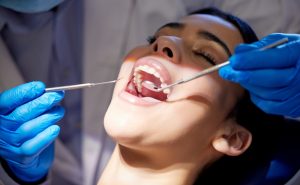One of the advantages of living in the 21st century is that we have access to excellent dental care. No longer are we limited to having a bad tooth pulled by the local barber, with nothing to replace the missing tooth! Now we can get custom dentures or even more impressive, have a missing tooth replaced with a dental implant, made to fit each individual jaw and smile.
What Are Dental Implants?
Dental implants are replacement teeth that include a replacement root surgically implanted into the jaw. A replacement tooth is then attached to the base. The primary advantage of a dental implant is that the new tooth is not dependent on neighboring teeth for support. Dental implants are stable and permanent.
Strategically placed implants can even be used to hold permanent, cemented bridges in place, eliminating the need for dentures.
Related Post: Dental Implants: Are They Right For Me?
Caring for Your Dental Implants
Once you’ve received your dental implant, you still need to perform daily oral and dental care, similar to what you would do for a real tooth. Immediately following surgery to insert your implant, follow your dental surgeon’s advice.
You may use ice to reduce swelling and take ibuprofen or acetaminophen for any pain you may experience. If your oral surgeon has prescribed antibiotics, be sure to take all of them as prescribed. Also, avoid vigorous exercise during the healing period.
If you have dentures covering the surgery site, wear the dentures as little as possible, as it will irritate the surgical site. Remember to always leave your dentures out at night.
Warm saltwater rinses are beneficial for healing, post-surgery. Mix one teaspoon of table salt into one cup of warm water and swish around the implant area. Holding the warm saltwater mouthwash over the surgical area will aid in the healing. Do this as often as possible for the first week after surgery.
Any stitches you have will be disolvable but may take two to three weeks to dissolve. Should they be problematic, visit your dental surgeon for stitch removal.
If you are a smoker, do not smoke until the surgical area is healed. Smoking after surgery will slow down the healing process markedly. Perhaps this would be a good time to consider quitting smoking.
Once your new implant has settled, it is important to continue with daily care. Successful dental implant surgery is dependent on keeping the mouth as clean as possible. Continue to brush your other teeth as normal, avoiding the implant area. Once the tenderness of surgery is reduced, start brushing your implant carefully.
Flossing your implant properly is very important to keep the gum around the implant healthy. Use floss tape and carefully move the tape up and between the implant and the gum to remove debris. Your oral surgeon may recommend other flossing tools, and will show you how to use them to protect your implant and gums.
Related Post:
Related Post: 5 Daily Dental Care Tips For Your Dental Implants
Dental Implants at Parkcrest Dental Group
Parkcrest Dental Group is accepting new patients, and if you are thinking of a dental implant, our board-certified oral surgeons are ready to help you improve your oral and dental health. Call our office today to schedule an appointment.





